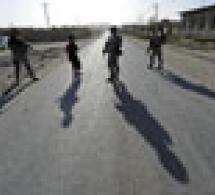 |
 |
"No Rush For The Exits" in Afghanistan
Kimberly and Frederick Kagan argued for a gradual drawdown of U.S. troops from Afghanistan in an editorial for The Wall Street Journal earlier this week. Citing the conditions on the ground, they say this is not the time to be pulling troops out. But if withdrawal is necessary, they say, it must happen judiciously and in small numbers. They suggest that a removal of 5,000 troops may be manageable despite the risks but pulling more could threaten to undo the fragile progress that has been made since the surge began 18 months ago. The gains made in the south could be held by U.S. and Afghan forces, they stress, only if we hold fast through the fighting season to November. This could provide us with the opportunity to create “meaningful security zones” around all the major population centers in the south; something that hasn’t been accomplished since 2001. Read the full op-ed here.
NATO Leaders Agree on Modest Withdrawal
Brussels, Belgium 9 June 2011- U.S. and NATO defense ministers met to review the air campaign in Libya and discuss their plans for troop redeployments in Afghanistan. General Petraeus, the ISAF Commander, also briefed the ministers on the progress in Afghanistan.
Secretary of Defense Robert Gates spoke at a press conference following the meeting this morning reiterating his belief that “…gains could be threatened if we do not proceed with the transition to Afghan security lead in a deliberate, organized and coordinated manner."
"Even as the United States begins to draw down next month, I assured my fellow ministers that there will be no rush to the exits on our part — and we expect the same from our allies," he told the press conference. Earlier this week Gates recommended the U.S. maintain only “joint bases” with the Afghan forces after its mission ends.
NATO chief Anders Fogh Rasmussen voiced similar caution saying, "There will be no rush for the exits. And that has been confirmed at today's meeting. On the contrary, all ISAF partners will stay committed and see this through." For more on this story, click here.
The President’s Decision…
The President held an hour long videoconference with Afghan President Hamid Karzai yesterday, negotiating a plan for the transition to an Afghan security lead. Obama will also be meeting with General David Petraeus within days in order to receive the ISAF Commander’s recommendation.
A new poll in the U.S. by The Washington Post and ABC News shows a 16 point rise in public support for the war in Afghanistan, giving President Obama more breathing room as he reaches a decision on the specific number of troops that will be withdrawn.
Meanwhile, new ties between the militant Haqqani Network and the Pakistani military have made troop withdrawal from Afghanistan even harder. Based in North Waziristan near the Afghan border, the Haqqanis have close links to al Qaeda and have orchestrated several high-profile attacks across the border in Afghanistan against both U.S. and Afghan forces. ISW Senior Analyst Jeffrey Dressler, an expert on the Haqqani Network, spoke to The Washington Times about this significant development. Read the story here.
For more information on the Haqqani Network and other militant groups in North Waziristan, click here.
